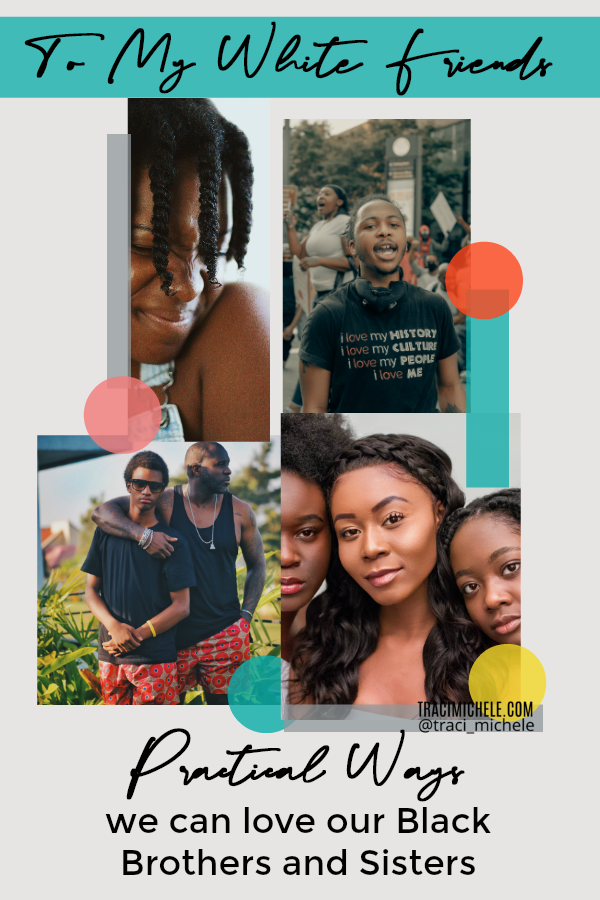This is Part 3 of a five day series: A Message To My White Friends- Practical Ways We Can Love Our Black Brothers and Sisters.
You can read Part 1 Here.
You can read Part 2 Here.
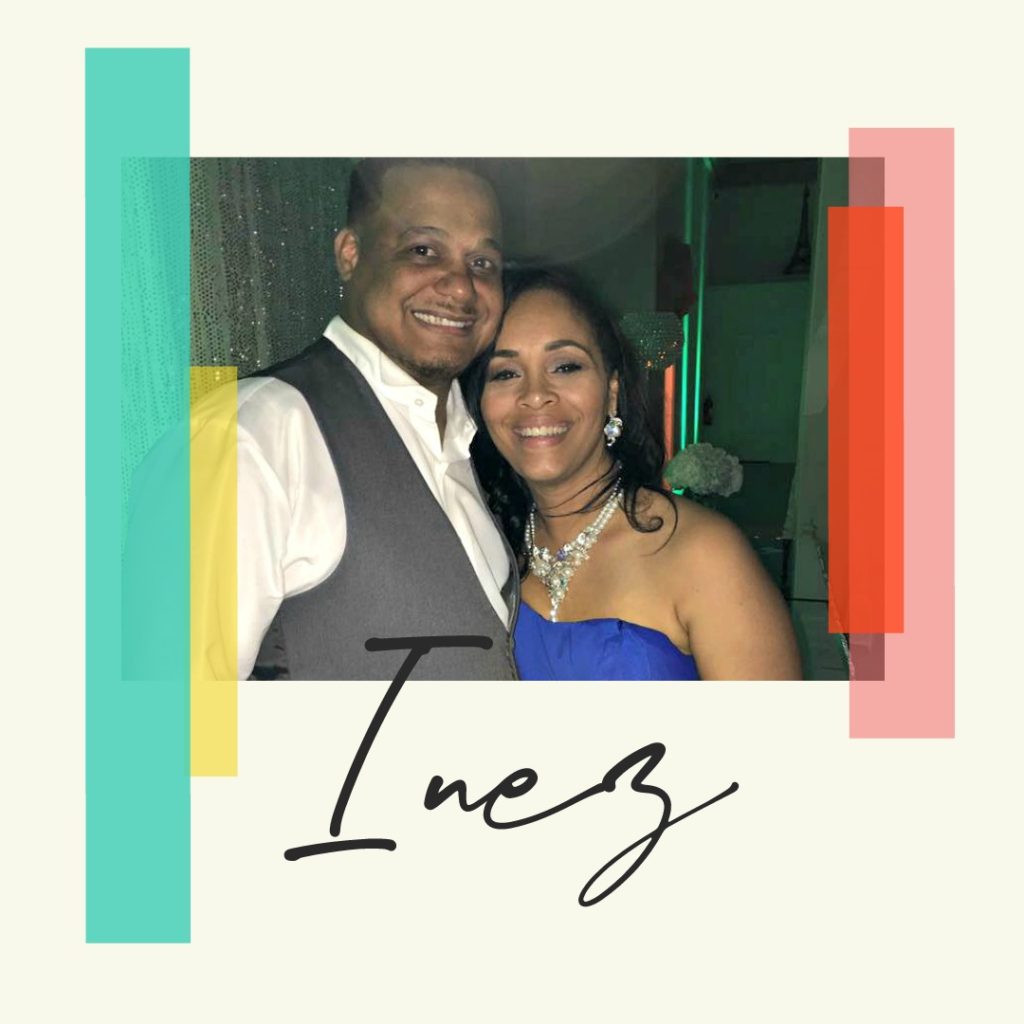
Inez says,
Be A Willing And Attentive Listener
Be a willing and attentive listener to the incidents, circumstances and feelings of your black friends. This will require that you push past your comfort zone to try to get some authentic understanding of what we as black people have dealt with most of our lives. Be willing to ask questions and be okay with the answer even if it’s unfamiliar to your experiences and even if you don’t agree. Share with us the reality of your existence with your parents, friends, grandparents etc.
Stand With Us & Speak Up For Us
Stand with us and be brave enough to speak up for us (and for our children and our grandchildren) when you become aware of what’s happening to us.
Show Love To Us
Hug us and let us know that you love us and our color doesn’t matter to you. Don’t pretend not to see my color but embrace it as I do you to help me feel even more comfortable in my skin as you also become more comfortable in yours.
Talk To Your Children
Please please please talk to your children about this and your expectations. Be present and don’t look the other way or make excuses for people who treat us bad.
Don’t Make Us Feel Like A Project Or A Charity Case
One thing I have asked is not to make us feel like a project or charity case. Instead, include us. Be free to be honest about who you are and your stance because we will respect that more than being fake and finding out it was a facade. Show us that we can trust you as our friend and your intention is not to add more insult to injury.
Don’t Tell Black People They Are Over Exaggerating About Racism
Don’t insult people or act as if they are over exaggerating about racism. Instead of accusing people of using the race card, attempt to gain an understanding as to how they arrived to the way they think about race. Racism is taught and passed down generation to generation. Curses can be broken, we just have to make a decision to be the one who will stand up for change. It is evident in more than what is said. We see it in body language, looks, stares, reactions to us, ignoring us, changing where you walk when you see us coming, etc. I pray that those actions are magnified even within yourselves so you can see for yourself what is communicated to us. As Christians we are equal in the kingdom and that should also be reflected in the natural. Jesus said if you love Me you will keep my commandments which includes loving your neighbor as yourself. If you are hurting you seek relief and that also must be extended to your black friends.
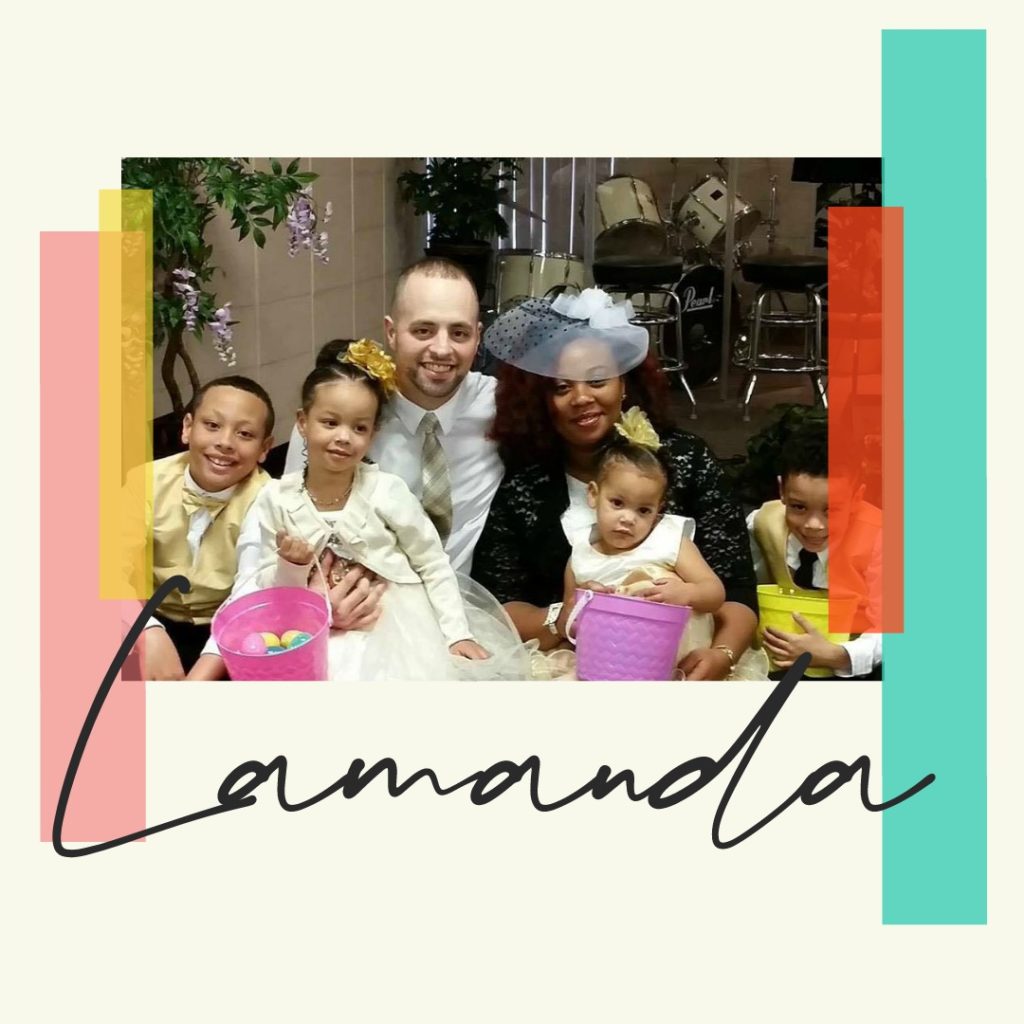
Lamanda says,
Meditate and Pray
Meditate and Pray on these verses and others from Scripture: (Jeremiah 22:3, Prov. 31:8-9, Isaiah 1:17, Psalms 82:3)
Be Willing to Help
Be God’s representative and fight for those who are suffering. How? Start by praying out loud, in groups at bible studies for justice, racism, and unity. Then, act! Contact your local police department and make sure body cameras are worn and turned on at all times. Then write to your city representatives and police department about the need for the audio on body cameras to not be able to be turned off (as some will turn them off when it is convenient).
Be Knowledgeable
Seek ways to be educated on the black experience through the lens of black voices. We have to have a time of being uncomfortable. Times of being uncomfortable are the times when God typically grows us the most. Listen to pastors, read authors, and watch documentaries of those that are outside of your ethnicity. When you don’t know something, what do you do? Google it! If we can do that with other topics and be Berean-like, why not in things that relate to other ethnicities? Be uncomfortable about not knowing about others’ cultures. Then, educate your children by reading age appropriate books to them with POC (People of Color) as the main characters. Learn how to be an active listener. Don’t listen to argue, give a retort, talk about your one black friend, or explain your own thinking about what makes sense to you. ASK OPEN-ENDED QUESTIONS, AND LISTEN!
Some books I would recommend are: The Color of Compromise by Jemar Tisby, Woke Church by Eric Mason, White Fragility – Robin Diangelo, Doctrine & Race – Mary Beth Swetnam, and Raising White Kids – Jennifer Harvey
Some Children’s Books I would recommend are: God Made Me and You: Celebrating God’s Design for Ethnic Diversity by Shai Linne, Heart & Soul: The story of America and African Americans by Kadir Nelson, Child of The Dream: A Memoir of 1963 by Sharon Robinson
Some Pastors/Speakers I would recommend: Jemar Tisby, Thabiti Anyabwile, Eric Mason, Dhati Lewis, Priscilla Shirer, Jasmine Holmes, Tony Evans, Jude 3 Project, Doug Logan, Bryan Loritts, Jackie Hill Perry, Dwight McKissic, Eugene McCauley, Kyle J Howard, Soong-Chan Rah, Derwin L. Gray, Bryan L. Carter, Mika Edmondson, Charlie Dates, Eugene Scott, Ernest Cleo Grant II, Austin Channing Brown, Christina Edmondson, Rich Perez, Chris Brooks, Carl Ellis, Jr., Dr. John Perkins, Sarita Lyons, Bobby Manning, Kristie Anyabwile, Russel Moore, H.B. Charles Jr., The Front Porch.
Some documentaries or movies I would recommend: “The 13th” on Netflix, “When They See Us” on Netflix about the Central Park 5 & an accompanying documentary on Amazon Prime -( Viewer discretion advised), Just Mercy, Harriet, White Savior: Racism in the American Church, Miss Virginia on Netflix, Selma, The Hate U Give, Hidden Figures, The Watsons Go To Birmingham.
Be Friends with Others Not Like You
Look at who you surround yourself with. What does your circle of friends look like? Who do your children spend time with? When was the last time a POC sat at your dinner table or you texted back and forth? What is the ethnic make-up of your church, and does it function in a way that truly reflects it’s membership? This one gets tricky because some would say if your circles do not allow for black to be in them then it is not necessary for you to seek them out. I disagree. This goes for minorities too! Seek out friendships that are out of the norm of your economic, social, or ethnic group. Be honest! If you went to any black person and told them “I desperately need diversity in my life for my sake and my children’s sake.” I guarantee you will be welcomed with open arms. It will take time to get to know one another and there may be disagreements on things, but work on it and listen to understand them and their perspective. To see the value a person unlike you can bring to your life is invaluable! A great foundation for friendship is usually built on transparency. This is often is hard to find, but paramount in building as we work to understand one another, seek justice, love mercy, and walk humbly.
Always Disrupt Racism
Call it out. Shine a light on it anytime you see it. Refuse to entertain insensitive talk in public or private. Use your ability to speak out for others. Some blacks are cautious about to speaking out on things in fear of being viewed in certain situations as “the angry black person” caricature.
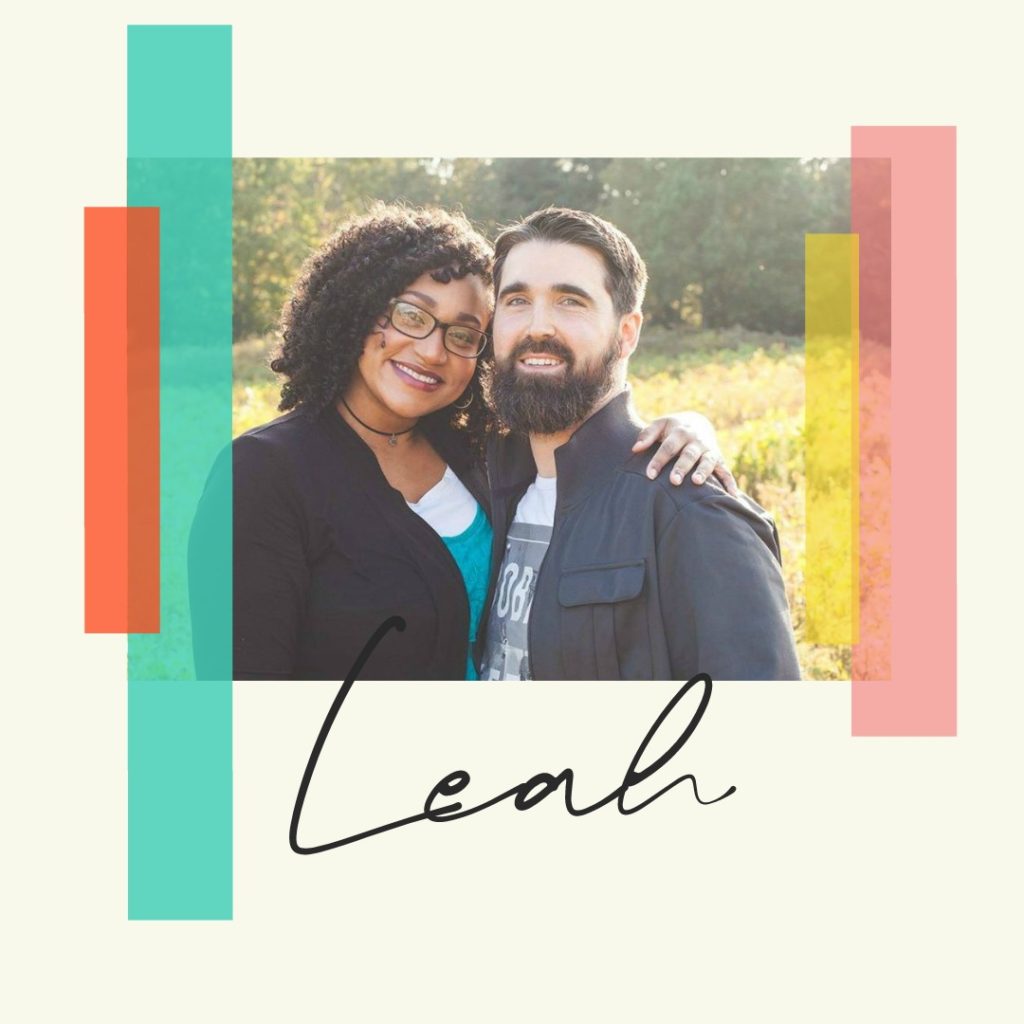
I See Racism As A Spiritual Issue
I truly see racism as a spiritual issue that only the ministering of the Gospel can solve. It will not go away until Jesus returns. I am convinced that if anything, the church as a whole must go out and preach the Gospel to every person. Men’s hearts are so utterly wicked that they will find any way to discriminate whether it be race, religion, or socioeconomic status.
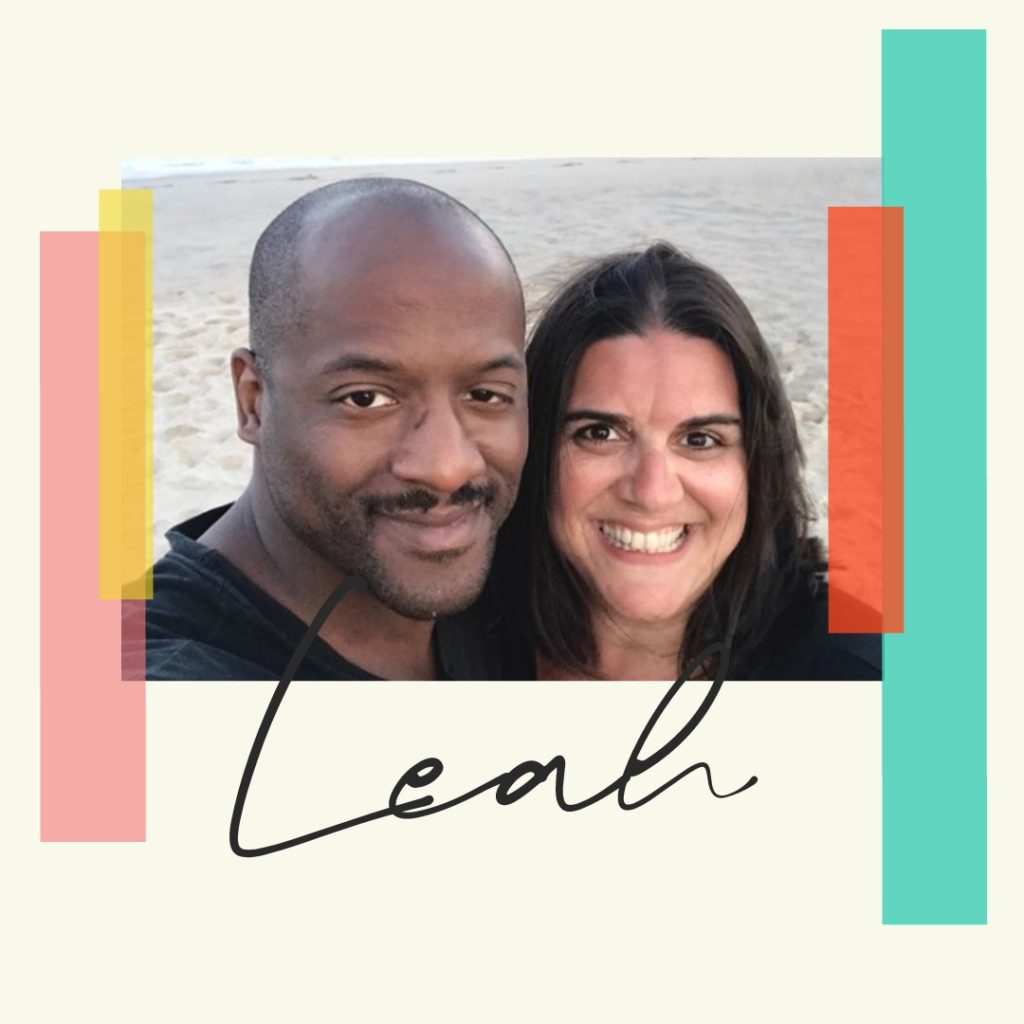
Leah F. says,
Check Where Your Beliefs and Opinions Were Formed From
First I’d say we all need to look at where our beliefs/opinions about different races were formed from. The initial response to racism is always a defensive one. I think we need to really ask ourselves if we’ve been forming opinions based off of the wrong things. Maybe a good deep dive into a history lesson of America. One of things we don’t realize is that slavery and Jim Crow laws have a huge effect on our society today. Systematic racism is real. Just because slavery or segregation are no longer legal, doesn’t mean the mind frame that people of color are to be treated differently doesn’t exist. Most don’t realize or remember that there was a time when people of color weren’t allowed to attend colleges, or work at certain jobs which now has an effect on the children and grandchildren of those people.
See Skin Color and Normalize All Skin Tones
Second, I think many are thinking that we just shouldn’t see skin color at all. That also is not a good way of thinking. We need to normalize all skin tones. That begins at home. Obviously noticing someone’s skin is a different color than your own isn’t a problem, but it’s shouldn’t be looked at as not normal. Adding dolls, books, paintings, etc, into our homes of all colors and races helps to normalize every race. White is not the normal or standard.
Treat Racism Like Any Other Sin
Thirdly, as Christians, we need to look at racism and treat it like any other sin. It needs to be taught as serious as any sin, and that it needs repenting from. The Bible is our guide and all men and women are made in the image of God. Sin is what separates us from Him, not our skin color.
Please come back tomorrow to hear more voices on this important subject!
